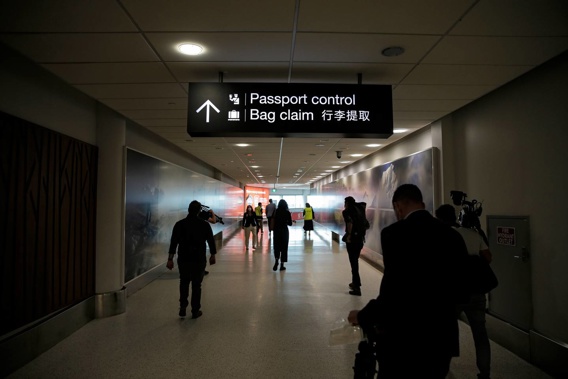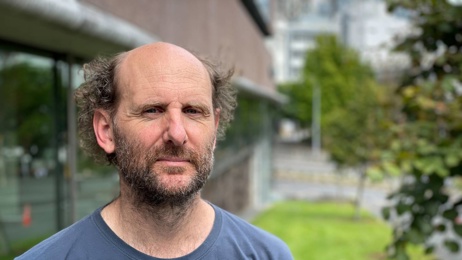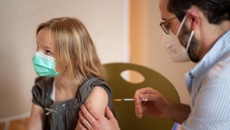
New Zealand is now truly pushing its luck with Omicron, an epidemiologist says, as officials report the single highest daily case count at the border since the Covid-19 pandemic began.
Most of the 65 new border cases reported yesterday tested positive for the virus on day 1 in MIQ – and around a third were staying in Auckland's Stamford Plaza facility.
There were also 217 cases already caught at the border still undergoing whole genome sequencing – and it was expected the vast majority would be the highly-transmissible Omicron variant.
During the same period, more than 18,000 people had arrived and been processed through MIQ.
Otago University epidemiologist Professor Michael Baker said case tallies as large as yesterday's weren't sustainable if New Zealand wanted to avoid a new community outbreak.
"You always try not to react to a daily total, but I think that certainly must be the largest number we've ever had on a single day."
It was.
In fact, the top 10 biggest days of active border cases have all been logged in the last three weeks.
After that, the next biggest was on August 13, with 12 cases.
With hundreds of active cases now in MIQ, Baker questioned whether the system had ever been under such pressure.
"On that basis, you might get evidence of a border failure every week," he said, adding that the threat called for a higher rate of testing to ensure no leaks occurred.
But with current volumes, he expected that outcome was simply a matter of time.
"It could happen with an MIQ staff member going out into the community before testing positive, and not all of these failures will translate into an outbreak, as we saw with [DJ Dimension].
"But we could end up with something like the beginning of the Auckland August outbreak, where we suddenly find one case of Omicron in the community that represents the tip of an iceberg.
"The trouble with Omicron, of course, is that it's very unforgiving, in terms of its level of infectivity – and I think we're really pushing our luck with the number of infected people arriving."
He repeated earlier calls for the Government to "turn down the tap" on travel into New Zealand, to buy two months of time to better prepare for a major outbreak.
Covid-19 modeller Professor Michael Plank agreed the risk came down to a numbers game.
"We've made good improvements to MIQ over time which will help, such as cohorting and better air ventilation, but 65 cases in a day is just massive," he said.
"If that continues, it'll become more and more difficult to stop something leaking out."
There have been nearly 200 Omicron cases detected at the border since December 1, with only 11 cases of the Delta variant.
"That's just reflecting the eye-watering infection rates that we're seeing around the world with Omicron," Plank said.
"The number of cases are completely unprecedented and there's a strong feeling that, in many countries, the true numbers of cases are being under-counted."
Because a lot of Omicron infections were milder, he said fewer people might be seeking tests – but they could nonetheless still transmit the virus.
The surge in border cases also demonstrated that pre-departure testing wasn't a fail-safe.
"In particular, when it's 72 hours before departure - and you take into account the fact that it takes probably two or three days, at least, for someone to develop enough virus that they actually test positive - that leaves a five or six-day period that someone could become infected, but still test negative on that pre-departure test," he said.
"That's why reducing the testing time interval from 72 hours to 48 hours will help a little bit – but it still leaves quite a few days when someone could get infected."
Plank said rapid antigen testing taken at the airport on the day of departure could help, "but again, that's not going catch every last case".
Otago University virologist Dr Jemma Geoghegan said that with Omicron cases exploding overseas, it wasn't surprising cases were piling up at our own border.
"We've learned from previous incursions that our border clearly isn't leak-proof," she said.
"When Delta had replaced pretty much everything in MIQ, it didn't take too long for it to escape into the community. So, to be honest, I'm surprised it's taken [Omicron] this long."
While the threat was growing, Geoghegan said New Zealand still had the advantage of learning from experiences overseas, as it had done over the past two years.
"What's important is the number of people needing hospital care, particularly in places that have high vaccination rates," she said.
"And the number of cases seem to be decoupled from the number of hospitalisations. But again, over the next few weeks, we'll learn more about that, as there's always a lag time between cases and hospitalisations."
The Ministry of Health said New Zealand had taken steps to manage the risk of a community Omicron outbreak linked to border cases, including increasing the period overseas arrivals must spend in MIQ, and shifting the focus of whole genome sequencing to areas of most risk, such as for any cases in border workers.
"The MIQ system exists to catch cases at the border," the ministry said in a statement.
"Managed isolation and quarantine facilities are well set up to care for Omicron cases and protect the community. The staff at facilities are experienced in managing and caring for positive cases."
Meanwhile, there were 28 new community cases recorded yesterday and two deaths.
A man in his 30s died at home on January 5. He was tested for Covid post-death and returned a positive result.
Another man in his 60s died with Covid at Middlemore Hospital on Sunday.
Thirty-one people are in hospital with Covid - two in ICU.
Take your Radio, Podcasts and Music with you









